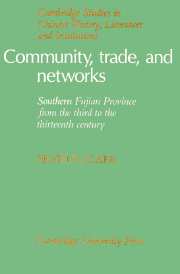Book contents
- Frontmatter
- Contents
- List of maps and tables
- Acknowledgments
- 1 Problems and approaches
- 2 The late Tang
- 3 The interregnum: politics, structure, and administration
- 4 The interregnum: society and economics
- 5 The Song: demography and networks
- 6 The Song: trade and economy
- 7 Conclusions
- Appendix 1 Townships (xiang), villages (li), and command brigades (dubao) under the Song
- Appendix 2 A discussion of population distribution
- Appendix 3 Pre-Song and Song bridges by district in twenty-five-year intervals
- Appendix 4 Place names in the Yunlu manchao and Zhufan zhi
- Appendix 5 Abbreviations
- Notes
- Glossary
- Bibliography
- Index
1 - Problems and approaches
Published online by Cambridge University Press: 13 October 2009
- Frontmatter
- Contents
- List of maps and tables
- Acknowledgments
- 1 Problems and approaches
- 2 The late Tang
- 3 The interregnum: politics, structure, and administration
- 4 The interregnum: society and economics
- 5 The Song: demography and networks
- 6 The Song: trade and economy
- 7 Conclusions
- Appendix 1 Townships (xiang), villages (li), and command brigades (dubao) under the Song
- Appendix 2 A discussion of population distribution
- Appendix 3 Pre-Song and Song bridges by district in twenty-five-year intervals
- Appendix 4 Place names in the Yunlu manchao and Zhufan zhi
- Appendix 5 Abbreviations
- Notes
- Glossary
- Bibliography
- Index
Summary
Introduction
The problem
The history of China is, of course, long and infinitely complex. The embracing term “China” itself masks much of the complexity, for it too easily suggests some monolithic and uniform whole. How easy it is to forget that the geographic entity we call China is comparable not only in size but also in regional diversity to the entity at the other end of the Eurasian land mass that we call Europe. And surely no one would argue that European history, despite its general origins in the Greco-Roman tradition, is monolithic. It is, in fact, a fascinating twist of history that China evolved largely as a political whole while Europe has been fractured through most of its evolution. Both land masses had ample opportunity to develop in either direction.
Yet because of this twist, Chinese history has too often been approached as if it really were monolithic. Western students of China's past have only recently begun to apply to their tasks the methods of regional and local history that became so important in European and American historiography earlier in this century. As a result, stereotypical images based on broad generalizations have evolved to describe China at any point in its history. The era of the Han dynasty is thought of as an agrarian period of great autarkic latifundia and little economic integration; the Tang is characterized by the rise of rural marketing networks and an increasingly sophisticated economy; the Song is identified with its great technology and highly developed commercialization. To be fair to our historical tradition, these are legitimate gross generalizations.
- Type
- Chapter
- Information
- Community, Trade, and NetworksSouthern Fujian Province from the Third to the Thirteenth Century, pp. 1 - 18Publisher: Cambridge University PressPrint publication year: 1991



